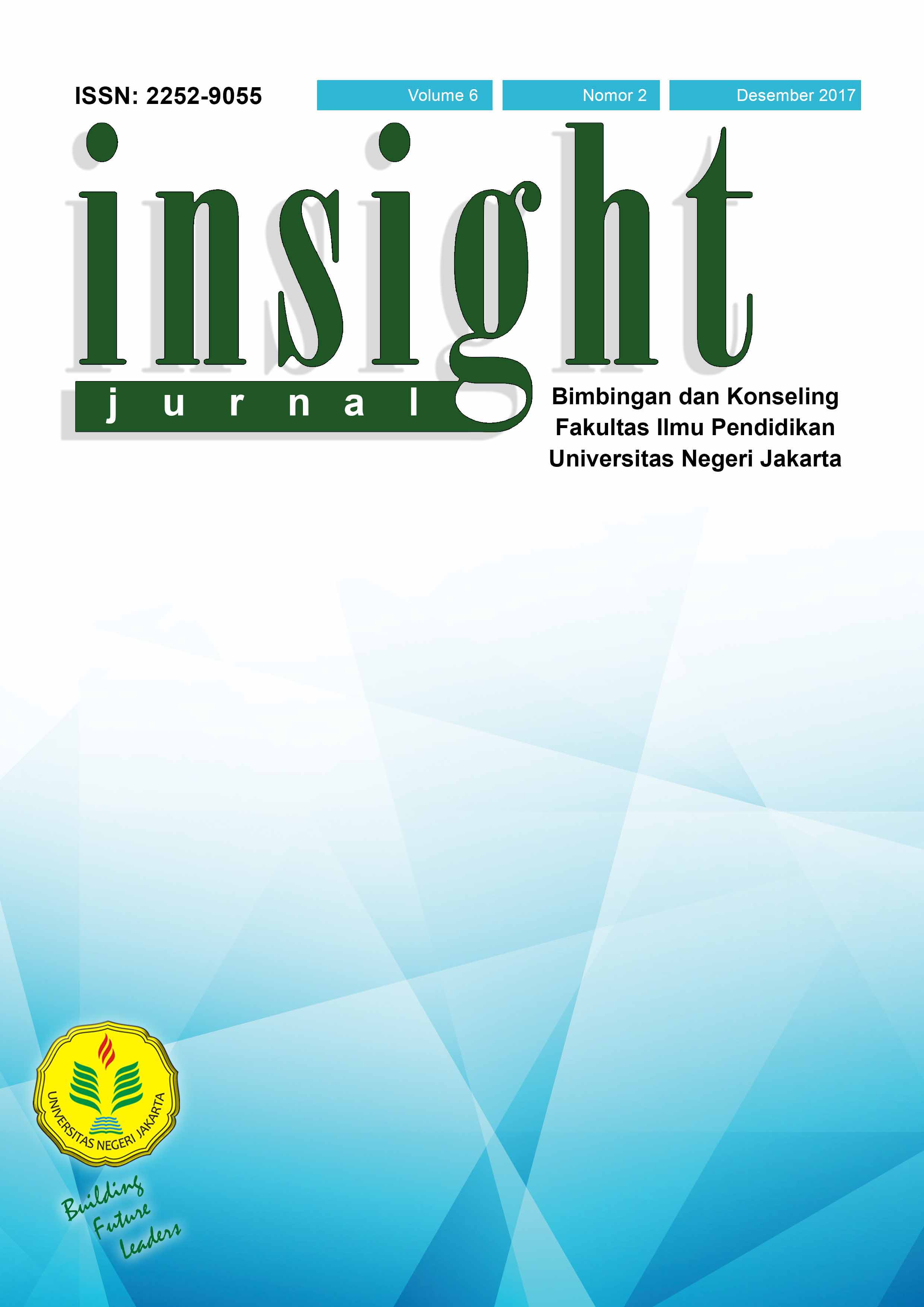LAYANAN BIMBINGAN KELOMPOK UNTUK MEMBINA SELF EFFICACY SISWA
DOI:
https://doi.org/10.21009/INSIGHT.062.04Keywords:
Layanan Bimbingan Kelompok, Self efficacyAbstract
Tujuan dari penelitian ini adalah untuk mengetahui efektivitas layanan bimbingan kelompok untuk membina self-efficacy siswa di sekolah menengah kejuruan (SMK) Budhi Warman II Jakarta Timur. Penelitian ini menggunakan rancangan penelitian Quasi Eksperimen. Pengujian hipotesis pada penelitian ini menunjukan angka probabilitas Asymp.Sig. (2-tailed) self-efficacy siswa sebesar 0,000 atau probabilitas di bawah alpha 0, 05 (0,000 < 0, 05) dari hasil tersebut H0 diterima H1 ditolak. Hasil tersebut menunjukan bahwa layanan bimbingan kelompok efektif untuk membina self-efficacy siswa di sekolah menengah kejuruan (SMK) Budhi Warman II Jakarta Timur
References
Astuti, P. P. (2013). Efektivitas Metode Bermain Peran (Role Play) Untuk Meningkatkan Keterampilan Komunikasi Pada Anak. EMPATHY Jurnal Fakultas Psikologi, 2(1).
Bates, P. (1980). The effectiveness of interpersonal skills training on the social skill acquisition of moderately and mildly retarded adults. Journal of Applied Behavior Analysis, 13(2), 237–248.
Elfira, N. (2013). Peningkatan Kemandirian Belajar Siswa melalui Layanan Bimbingan Kelompok. Konselor, 2(1).
Folastri, S., & Rangka, I. B. (2015). Prosedur Layanan Bimbingan dan Konseling Kelompok. Bandung: Mujahid Press.
Gazda, G. M. (1989). Group counseling: A developmental approach. Citeseer.
Howlin, P., & Yates, P. (1999). The potential effectiveness of social skills groups for adults with autism. Autism, 3(3), 299–307.
Ifdil, I., Apriani, R., Yendi, F. M., & Rangka, I. B. (2016). Level of students self-efficacy based on gender. COUNS-EDU: The International Journal of Counseling and Education, 1(1), 29–33.
Janis, I. L., & Mann, L. (1965). Effectiveness of emotional role-playing in modifying smoking habits and attitudes. Journal of Experimental Research in Personality.
Karwowski, M., & Soszynski, M. (2008). How to develop creative imagination?: Assumptions, aims and effectiveness of Role Play Training in Creativity (RPTC). Thinking Skills and Creativity, 3(2), 163–171.
Lestari, I. (2012). Pengembangan Model Bimbingan Kelompok Dengan Teknik Simulasi Untuk Meningkatkan Kecerdasan Emosi Siswa. Jurnal Bimbingan Konseling, 1(2).
Margono, S. (2005). Metodologi penelitian pendidikan. Jakarta: Rineka Cipta.
Nikendei, C., Zeuch, A., Dieckmann, P., Roth, C., Schäfer, S., Völkl, M., … Jünger, J. (2005). Role-playing for more realistic technical skills training. Medical Teacher, 27(2), 122–126.
Prayitno, E. A., & Amti, E. (2004). Dasar-Dasar Bimbingan dan Konseling. Jakarta: Rineka Cipta.
Putrisari, F., Hambali, I. M., & Handarini, D. M. (2017). Hubungan self efficacy, self esteem dan perilaku prokrastinasi siswa madrasah aliyah negeri di Malang Raya. TERAPUTIK: Jurnal Bimbingan Dan Konseling, 1(1), 60–68.
Rangka, I. B. (2017). Implementasi Pembelajaran Karakter-Cerdas Melalui Kegiatan Kelompok. In Seminar Nasional Pendidikan PGRI 2017 (pp. 491–498). Palembang: Pengurus besar PGRI.
Romlah, T. (2001). Teori dan praktek bimbingan kelompok. Malang: Universitas Negeri Malang. Malang.
Rusmana, N. (2009). Bimbingan dan Konseling Kelompok di Sekolah (metode, teknik dan Aplikasi). Bandung: Rizki Press.
Tuckman, B. W., & Jensen, M. A. C. (1977). Stages of small-group development revisited. Group & Organization Studies, 2(4), 419–427.
Downloads
Published
Issue
Section
License
Authors who publish with this Journal agree to the following terms:
- Author retain copyright and grant the journal right of first publication with the work simultaneously licensed under a creative commons attribution licensethat allow others to share the work within an acknowledgement of the work’s authorship and initial publication of this journal.
- Authors are able to enter into separate, additional contractual arrangementfor the non-exclusive distribution of the journal’s published version of the work (e.g. acknowledgement of its initial publication in this journal).
- Authors are permitted and encouraged to post their work online(e.g. in institutional repositories or on their websites) prior to and during the submission process, as it can lead to productive exchanges, as well as earlier and greater citation of published works.
Users/public use of this website will be licensed to CC BY







